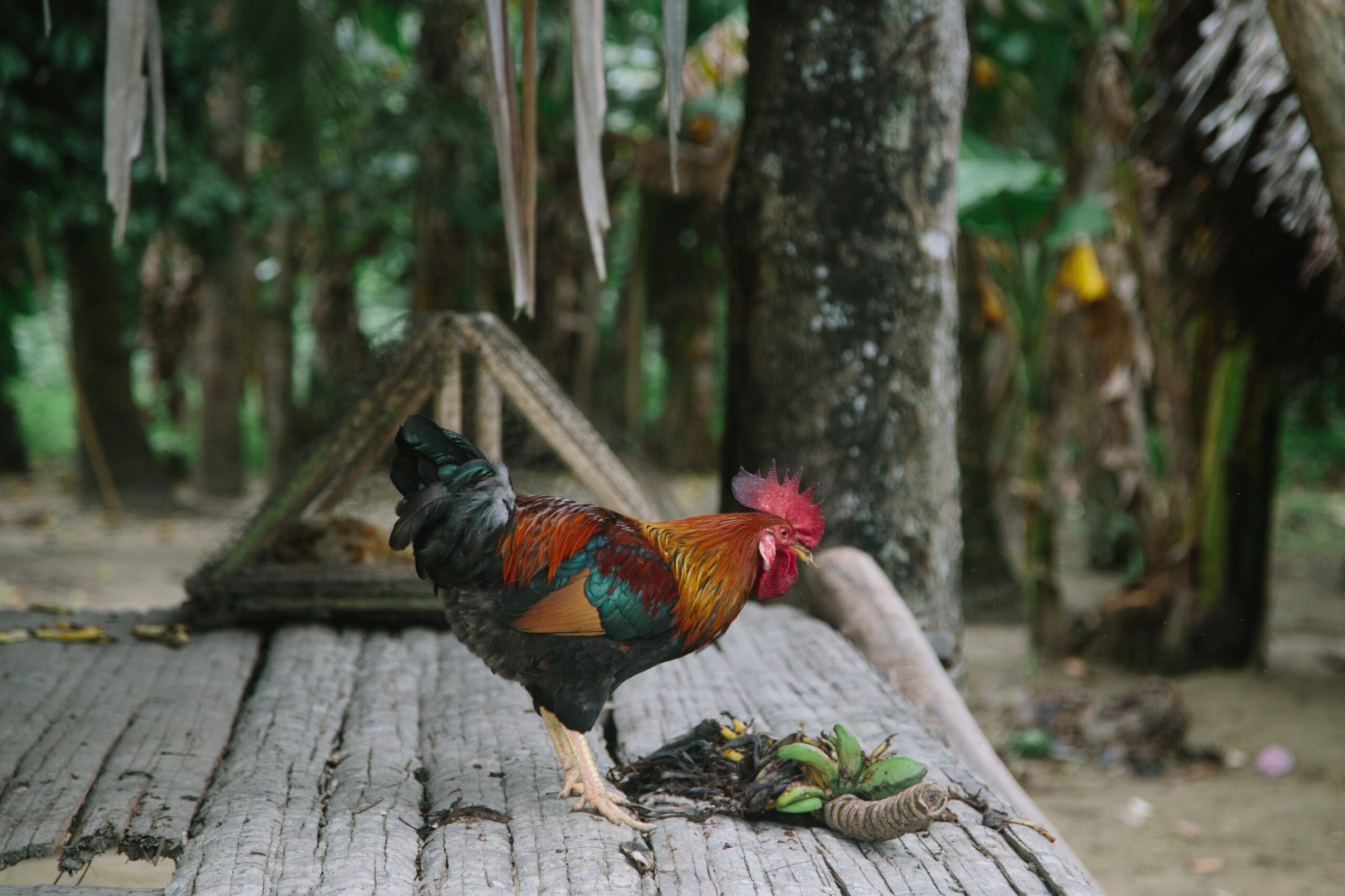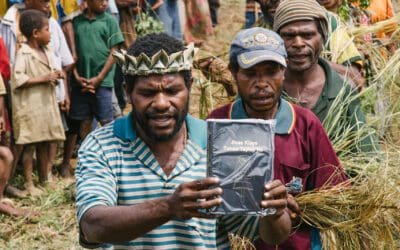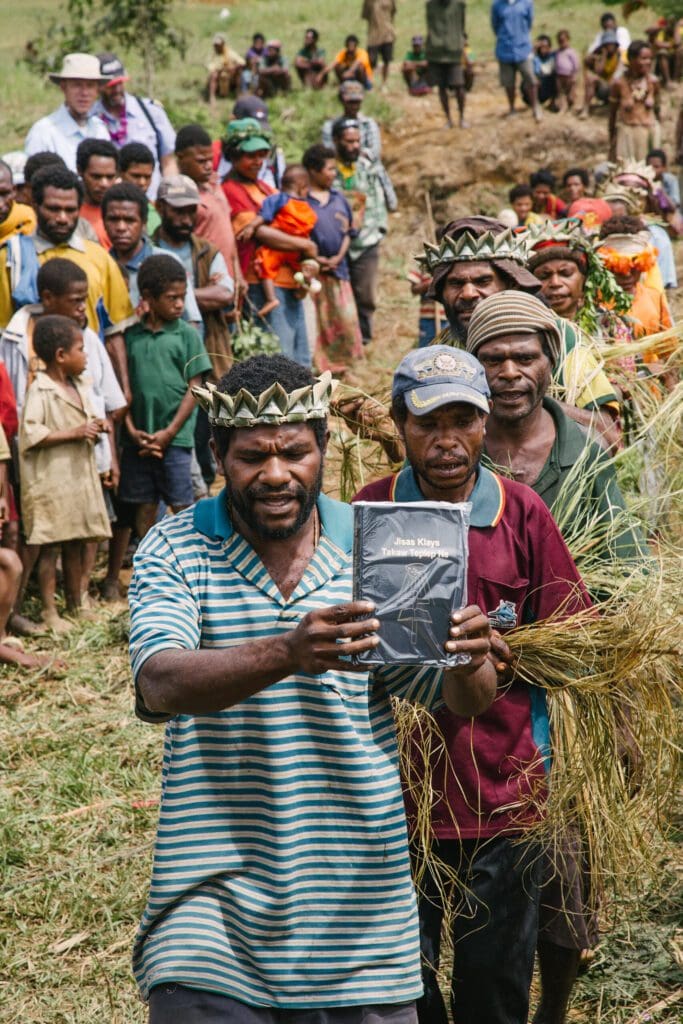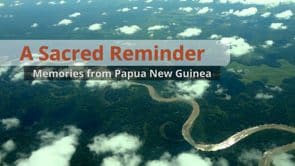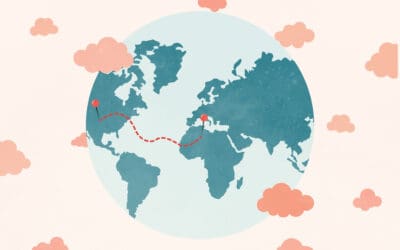Three decades ago Kyle and Kathy Harris began ministering among a people group deep in the tropical jungle in Papua New Guinea. The Nend people’s contact with the world beyond their territory had been very limited, and they’d been largely untouched by the Gospel. Their daily lives revolved around a traditional belief system that placed them at the mercy of the spirit world all around them.
Kyle, Kathy, and their two young children settled into life in Pasinkap village. They formed friendships with their new neighbors, and poured themselves into learning the people’s way of life. They plunged into the arduous task of learning the language in which the Nend people spoke, thought, and dreamed — and in which they communicated with the spirits.
The Harris family had two significant goals: to facilitate the translation of God’s Word into the Nend language, and to be living examples of how Christ’s followers are meant to live. Their hope was that their incarnational living would create in the Nend people a hunger for these Words that had the power to transform their lives and to give them these Words in their own heart language — the only language that truly spoke to their entire being and which was integral to their spiritual lives.
The work was slow going. “A translation work was begun and we shared about the love of Jesus, offering a clear and better alternative to their fear-based animism,” Kyle wrote. But change takes time, and during our ministry there we saw few results in terms of people turning to the Lord.”
In some places translation work proceeds at a pace that results in a quality translation of the entire New Testament in less than a decade. However, the conditions that make such rapid progress possible were not present in the jungles of Papua New Guinea. Kyle and a group of local men pressed hard into the challenging task of translating God’s Word into a language that didn’t seem to have the vocabulary to express key concepts. And since almost nothing had ever been written in this language, the men also wrestled with how best to represent its many sounds and patterns.
At long last the people received their first portion of Scripture — the story of Jesus’ birth. Yet to their great disappointment, the Harris family needed to leave Papua New Guinea before even one book of the New Testament was finished. Though they had the joy of leaving in the Nend people’s hands a portion of God’s Word in their own language, they grieved at seeing very little impact on the daily lives of the people they loved so deeply.
Several years later another Pioneer Bible Translators family, Norm and Jill Weatherhead and their two young sons, settled in Pasinkap to resume the ministry the Harrises had started. They, too, tried to live out the life-transforming Gospel they were there to proclaim, and Norm took up the reins of the translation work. He and a team of local men were able to translate the book of Mark into the Nend language. However, before it could be published, this family’s time was cut short by the serious illness of one of their sons. They, too, left without the joy of witnessing the significant changes that occur when people begin to see their beliefs and customs in light of the Truth revealed in God’s Word.
Others stepped up to help complete all the checking that was needed to ensure the accuracy of this translation of Mark. Finally, it was printed and began to be distributed among the Nend people.
God was not bound by the absence of missionaries.
In the years that followed, news from Pasinkap was sparse. Reports trickled in about evangelistic efforts of churches in neighboring language groups. However, there were no indications that lasting change was occurring in individual lives or in the community as a whole.
Yet God was at work. He was not bound by the absence of missionaries from Pioneer Bible Translators or any other group. Seeds sown by the first evangelists in the area, by the Harris and Weatherhead families, by neighboring believers, and by countless unnamed others began, at long last, to sprout. Seeds that had lain dormant so long that it was hard to expect ever to see a harvest finally began springing to life.
A few years ago stories began trickling in from the Nend area — stories indicating that the people were beginning to respond to the Gospel. A large number of Nend are now following Jesus. When 25 new believers in the village of Pasinkap were baptized, nearly 400 people came to watch, including many non-believers. They came out of curiosity and left filled with a message of wonderful Good News. God’s Church is now growing in this place, and more Nend people are coming into the Kingdom.
Perhaps the most striking indication of change came in the form of a chicken. A group of men in Pasinkap were studying Scripture together when they came to Jesus’ teaching about settling problems with their brothers before bringing their offerings to God.
These words of Jesus pricked their hearts.
Several years earlier these men had broken into the house that Kyle and Kathy had built and in which the Weatherhead family had subsequently lived. They had helped themselves to a few items they deemed worth stealing. Now here was Jesus, convicting them of their need to make things right with Kyle and Norm.
They could have brushed this off, excusing themselves with the reality that 10,000 miles of jungle, ocean, mountain, desert, and cornfields separated them.
They could not. They simply would not let themselves refuse to do what they clearly understood was required of them.
A chicken is just a chicken until it becomes a symbol of God’s transforming work in the hearts of His people.
In Nend culture, formally giving food is the traditional way of apologizing and repairing a relationship. So these men, convicted of wronging Kyle and Norm, determined that they must give a gift of food to set things right again.
They pooled their resources to purchase a rooster, then set off on an arduous journey to deliver it. Their destination was a village in another language group, where Pioneer Bible Translators missionary Martha Wade serves. They hiked through dense, hilly jungle for several hours, then slogged through miles of muddy sago swamp for several more.
Seven hours later they arrived, weary and sore, in Angguna village. After relating their story to Martha, they asked her to accept the rooster on Kyle and Norm’s behalf. (She did, and at last report, the rooster was living under her house and crowing with annoying frequency and volume.)
“We didn’t particularly need a rooster,” mused Kyle, “especially one 10,000 miles away. But we were overjoyed to hear how these Nend men were studying God’s Word and actually trying to live it out. A chicken is just a chicken until it becomes a symbol of God’s transforming work in the hearts of His people.”
